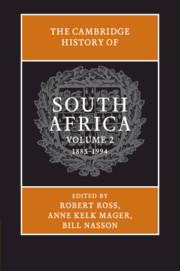Book contents
- Frontmatter
- Contents
- Contributors
- Acknowledgments
- Note on references
- Introduction
- 1 South Africa and South Africans: Nationality, Belonging, Citizenship
- 2 Imperialism, Settler Identities, and Colonial Capitalism: The Hundred-Year Origins of the 1899 South African War
- 3 Class, Culture, and Consciousness in South Africa, 1880–1899
- 4 War and Union, 1899–1910
- 5 South Africa: The Union Years, 1910–1948 – Political and Economic Foundations
- 6 South African Society and Culture, 1910–1948
- 7 The Apartheid Project, 1948–1970
- 8 Popular Responses to Apartheid: 1948–c. 1975
- 9 Resistance and Reform, 1973–1994
- 10 The Evolution of the South African Population in the Twentieth Century
- 11 The Economy and Poverty in the Twentieth Century
- 12 Modernity, Culture, and Nation
- 13 Environment, Heritage, Resistance, and Health: Newer Historiographical Directions
- Statistical Appendix
- Bibliography
- Index
Introduction
Published online by Cambridge University Press: 28 July 2011
- Frontmatter
- Contents
- Contributors
- Acknowledgments
- Note on references
- Introduction
- 1 South Africa and South Africans: Nationality, Belonging, Citizenship
- 2 Imperialism, Settler Identities, and Colonial Capitalism: The Hundred-Year Origins of the 1899 South African War
- 3 Class, Culture, and Consciousness in South Africa, 1880–1899
- 4 War and Union, 1899–1910
- 5 South Africa: The Union Years, 1910–1948 – Political and Economic Foundations
- 6 South African Society and Culture, 1910–1948
- 7 The Apartheid Project, 1948–1970
- 8 Popular Responses to Apartheid: 1948–c. 1975
- 9 Resistance and Reform, 1973–1994
- 10 The Evolution of the South African Population in the Twentieth Century
- 11 The Economy and Poverty in the Twentieth Century
- 12 Modernity, Culture, and Nation
- 13 Environment, Heritage, Resistance, and Health: Newer Historiographical Directions
- Statistical Appendix
- Bibliography
- Index
Summary
Going back more than a century, it is the tradition of Cambridge Histories to provide synthetic and authoritative surveys of the history of various parts of the world. Their primary concern is to produce broad essays that cover a given field of history at any given point and that serve as a starting point for those who need to gain access to the established historical scholarship on a given country or field of inquiry. This volume in the history of South Africa seeks to maintain this approach. It represents a culmination of several decades of scholarship on the history of South Africa in the twentieth century, above all, that produced by so-called radical or revisionist historians and their successors since about 1970. In this period, South Africa and its past turned from being an international historiographical backwater into what was, at least temporarily, one of the most dynamic and innovative fields of African historical scholarship. That said, producing a synthesis of the present kind has offered particular scholarly challenges. In this introduction, we try to examine what those challenges represent and how this volume attempts to meet them, if not necessarily to resolve them.
- Type
- Chapter
- Information
- The Cambridge History of South Africa , pp. 1 - 16Publisher: Cambridge University PressPrint publication year: 2011



